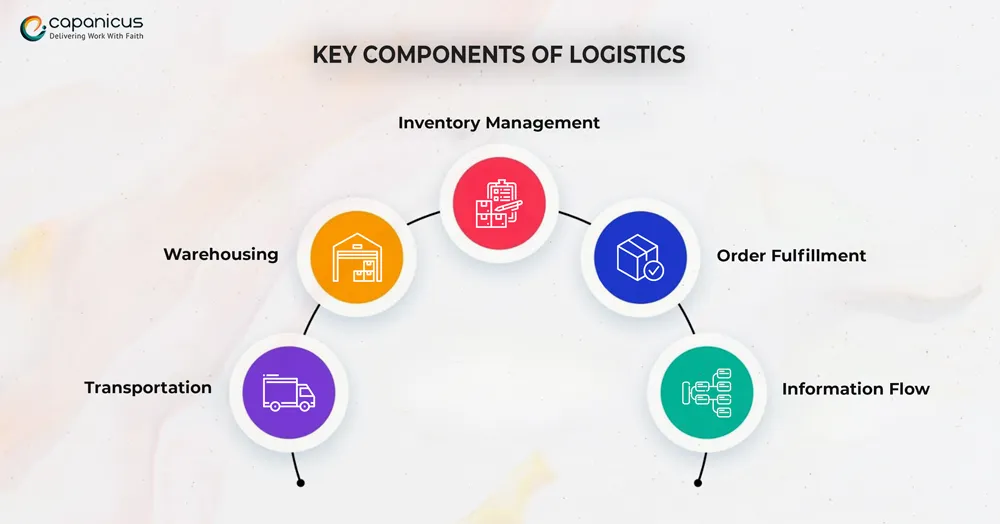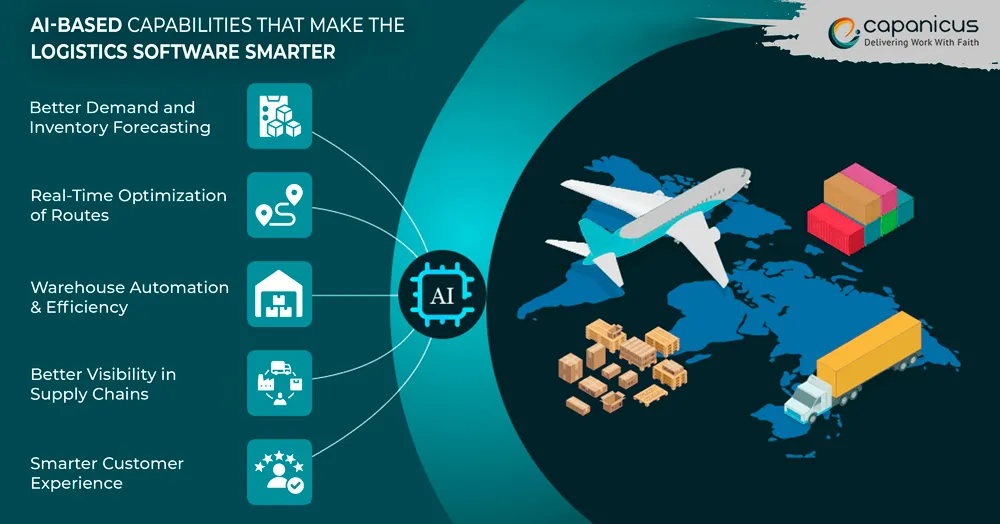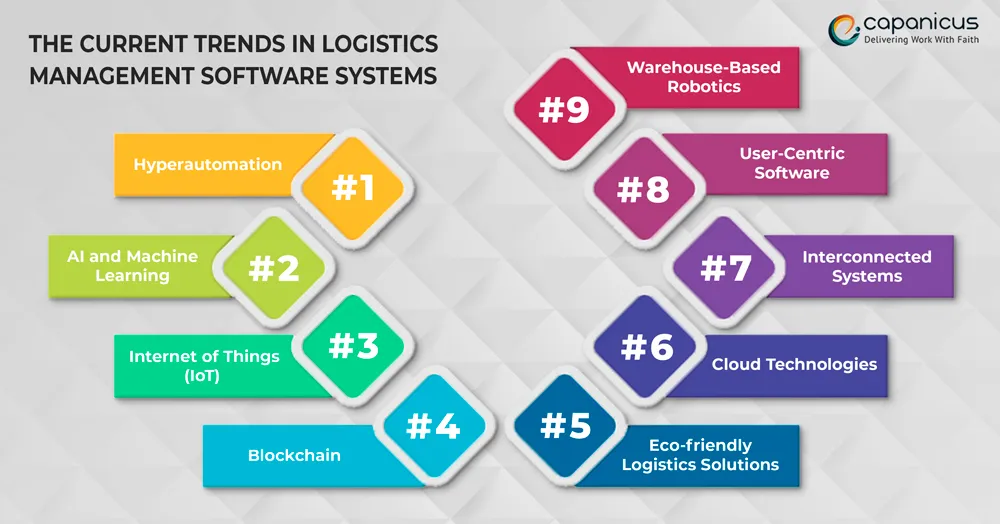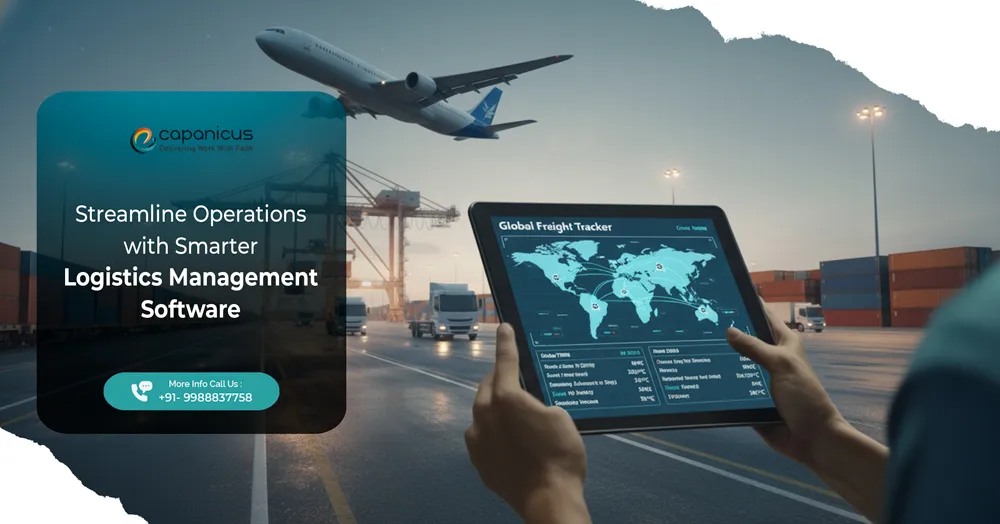
Is your supply chain business facing difficulties in processing orders precisely, managing inventory stocks, making timely deliveries of orders, and keeping costs low? Your inability to resolve these challenges effectively can result in various undesired outcomes for your business. These include loss of profitable business growth opportunities to your competitors and inefficient use and wastage of resources. Moreover, they include loss of time, revenue loss, and dissatisfied customers.
You must solve these challenges effectively and in a timely manner to keep your business going, growing, and successful.
Here, technology comes to your aid in the form of Smart and Modern Logistics Management Software. Advanced capabilities of this powerful, flexible, scalable, and feature-rich software help automate your processes and improve visibility and tracking throughout your business. Moreover, the capabilities play a role in optimizing inventories and delivery routes, centralizing analytics and data, and enhancing the customer experience. Thus, the logistics management software system helps your business get better at handling various challenges and enables you to operate your supply chain or logistics operations in an efficient, cost-effective, and profitable manner. Additionally, the system lets your business adapt well to emerging and evolving market trends as well as growing customer expectations. Furthermore, the logistics system enables you to cash in on lucrative business growth opportunities and get a competitive edge over your rival businesses.
Before having more knowledge on various key aspects of a logistics management software system, including its features, functions, advantages, etc., let’s first understand what logistics is all about and its importance for today’s supply chain businesses.
What is Logistics?
Logistics involves detailed planning, implementation. and control over the forward and reverse flow of goods and their storage. Moreover, it includes the planning, implementation, and control of various services and information, right from the point of origin to the point of consumption. The purpose of logistics is to achieve efficient and effective management of the flow and storage of goods and associated services, and information.
Logistics encompasses various functions, including transportation and warehousing of goods, management of goods inventories, and packaging of goods ordered and fulfillment of orders. The common purpose of all these functions is to precisely fulfill customers’ requirements for a particular ordered product and deliver it to them in a safe and good condition, in a timely manner, and at the right cost.
These are the key components of logistics.
Transportation
This is the process associated with the movement of goods from one location to another. It involves the selection of appropriate routes, shipping methods, and carriers for transporting goods.
Warehousing
This process is associated with the storage of goods. It includes receiving goods from transporters, storing them in warehouses in an organized manner, and managing inventory to ensure it remains accessible for fulfillment of orders.
Inventory Management
Inventory management is the process that involves maintaining control and oversight of stock levels of various goods to achieve a balance between supply and demand. This helps ensure that products are available in adequate quantities without too many holding costs.
Order Fulfillment
This relates to the entire process of processing customer orders, including picking the items bought by them and packing and shipping them. Moreover, this includes handling the goods returned by customers.
Information Flow
This involves the management of data and information related to the movement of goods. This process is vital for maintaining coordination and control within the logistics process.
Why is Logistics Significant?
Logistics is significant in supply chain operations due to these reasons.
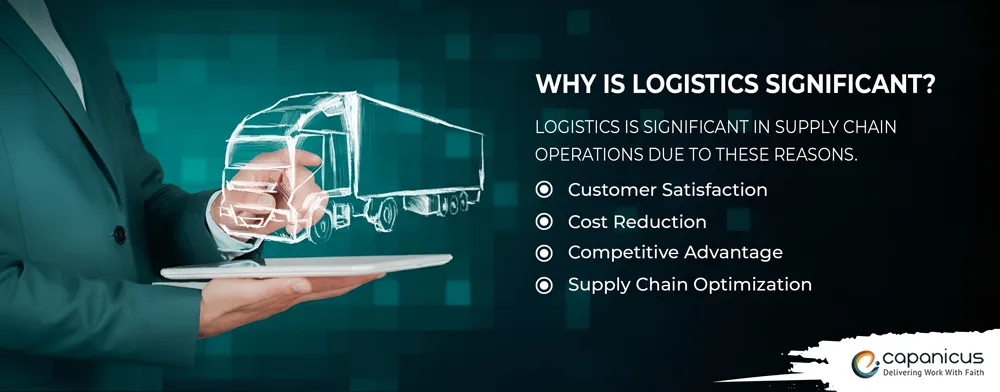
Customer Satisfaction
Effective logistics ensures that products reach customers’ places in a timely manner and in a safe and good condition. This consequently enhances customer satisfaction.
Cost Reduction
Efficient logistics management reduces costs associated with the transportation and storage of goods and the management of goods inventories.
Competitive Advantage
Businesses that are equipped with powerful logistics capabilities can provide a swifter and more dependable service that helps them remain competitive.
Supply Chain Optimization
Logistics is a necessary part of the wider supply chain that facilitates the efficient flow of materials and products and optimizes overall operations.
Basically, logistics is a crucial aspect of a supply chain business that is accountable for ensuring the right goods reach the intended location on time. This is essential for the effective fulfillment of customer demands and the attainment of business success.
It is time to know more about what a logistics management software solution is really about and the different aspects related to the solution, including core features, advantages offered, and current trends.
What is Logistics Management Software?
Logistics management software is an integrated technology system designed to automate, streamline, and optimize various supply chain operations associated with the logistics processes. This includes procuring raw materials and delivering finished products. Moreover, the software helps businesses effectively handle various logistics-related complications like shipment-related errors, damaged goods, and returns from customers.
The logistics process is responsible for moving goods efficiently between various places in the supply chain. These include factories, warehouses, distribution centers, ports, transportation hubs, retail locations, and customer locations.
The logistics management software system allows businesses to integrate and manage different aspects of the logistics process by providing them with real-time visibility and actionable insights. The various aspects it helps to manage include inventory, warehousing, transportation, order processing and fulfillment, and distribution. The software enables businesses to fine-tune storage practices, optimize transportation networks, and coordinate logistics execution with unmatched precision. When integrated with existing supply chain systems, logistics management software (LMS) facilitates clear decisions on inventory, delivery schedules, cost control, and customer service enhancement.
Main Features of Logistics Management Software
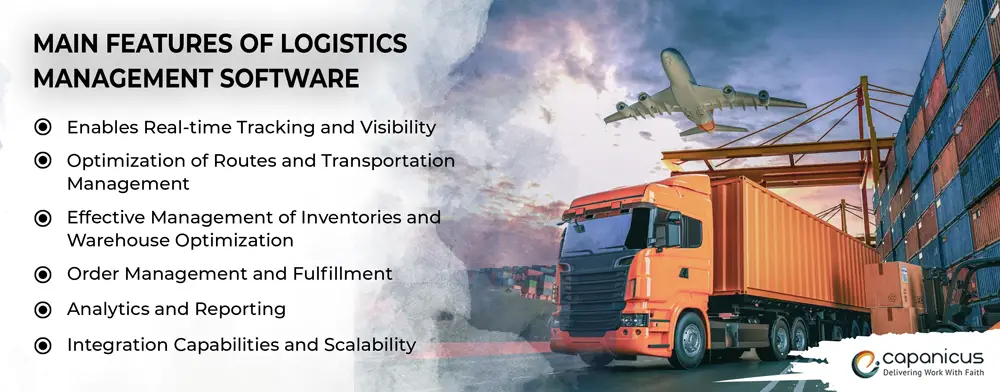
In an extremely competitive market today, consumer expectations continue to rise and evolve, and market demands continue to change. Therefore, utilizing advanced logistics software has become critical for businesses that are striving to maintain an edge in the age of digital transformation.
We are sharing the key features of a logistics management software system that can help enhance your supply chain operations and let you achieve clarity over complex challenges and address them effectively.
Enables Real-time Tracking and Visibility
Maintaining end-to-end and real-time visibility across the whole supply chain is extremely important for businesses involved. This includes maintaining visibility over the status of orders, stock levels, and movements related to the transportation of goods. Customers also need to track their orders. Moreover, they require quick updates regarding their delivery statuses, which can be sent to them through notifications and alerts. Maintenance of status order transparency is significant for businesses to effectively fulfill the commitments made to their customers and clients.
Additionally, transparency leads to enhanced levels of coordination and communication between various stakeholders, including vehicle drivers, professionals responsible for dispatch, and customers. Moreover, transparency helps businesses deliver customer orders in a precise and fast manner. This consequently enhances customer satisfaction and their loyalty towards businesses.
The logistics software system enables full visibility over various supply chain processes. This consequently enables teams to effectively identify and address challenges in the supply chains and ensure processes continue without disruption.
Optimization of Routes and Transportation Management
The core objective of logistics is to ensure movement of goods is done in an efficient manner. Keeping this in view, LMS is equipped with powerful transportation management tools that provide these essential capabilities.
Carrier Integration
The logistics process management software lets supply chain businesses connect with third-party logistics service providers to automate shipments and compare their rates and delivery times in real time.
Load Planning
The software also allows businesses to enhance the efficiency of their shipments by adjusting truck loads according to the weight, volume, and location. Optimization of loads leads to maximum utilization of space, decreased transportation-related costs, and increased profitability because of less number of trips and reduced fuel consumption.
Route Optimization
The logistics management software utilizes advanced machine learning (ML) and artificial intelligence (AI) algorithms and performs analysis of real-time data regarding weather conditions, traffic patterns, seasonal variations, and capacities of vehicles to find out the most cost-effective transportation paths. This helps ensure that orders of customers are delivered on time while keeping expenses low.
Fleet Management:
The software for logistics process management facilitates efficient and effective management of fleets by tracking driver performance and activities, fuel consumption, and vehicle maintenance. This leads to enhanced service reliability, better resource allocation, and lower costs for involved businesses.
The logistics software system provides businesses with a central view that enables them to better monitor and control their fleet of operations remotely. They get the ability to track the location of vehicles as well as their speed and status, leading to heightened accountability and transparency.
The software allows businesses to perform proactive maintenance of vehicles through automated tracking of vehicle maintenance schedules and sending alerts of upcoming maintenance due dates. Moreover, it monitors the performance of both vehicles and diagnostics, which leads to the identification of any potential issues before they escalate to major problems. Timely and predictive maintenance facilitated by the logistics software helps extend the life of vehicles and lower unexpected downtime.
Moreover, the LMS enables businesses to elevate the safety of drivers by monitoring their behavior with the help of AI-driven telematics and cameras. Furthermore, it helps them recognize risky driving habits of drivers. The logistics software also provides businesses with data for planning and organizing targeted driver training programs. Additionally, it sends real-time alerts to drivers about potential hazards, which consequently helps in the prevention of accidents.
The logistics process management software also helps to reduce the costs of fleet operations in various ways. It performs optimization of routing and elevates management of fuel consumption, resulting in decreased fuel-related costs. Moreover, the software helps to lower expenses related to maintenance through the prevention of more serious breakdowns and facilitating the on-time delivery of services. Furthermore, the software enables streamlining and automation of workflows, leading to a lowering of operational expenses.
Centralized Communication
The shipment-related data is gathered in one place in the LMS and used to enable smooth communication among involved stakeholders. They include manufacturers, suppliers, distributors, carriers, sales, and customer service of associated businesses and customers. Clear communication facilitates a reduction in delays and errors and keeps everyone informed during every stage of the process. Moreover, clear communication promotes the development of strong relationships among supply chain partners and builds trust and loyalty among customers.
To achieve elevated, streamlined, and efficient transportation management and route optimization, businesses can opt for a comprehensive logistics management software system. Apart from managing transportation and fleets, the software also assists in the management of inventories, tracking of orders, and organizing warehousing-related operations. Alternatively, you can go for a dedicated Transportation Software Development Solution that exclusively focuses on managing the planning of routes, selection of carriers, and tracking the goods’ movement through trucks, shipments, and other available modes of transportation.
Effective Management of Inventories and Warehouse Optimization
Effectively managing various inventories and optimizing warehousing are significant for the seamless operations of a supply chain. A logistics management software that is equipped with powerful inventory asset management capabilities lets businesses streamline warehouse-centered operations. Moreover, the capabilities aid in forecasting the demand for goods, maintaining optimal stock levels, and optimizing layouts in warehouses. By helping businesses attain end-to-end visibility across multiple facilities in different locations, the software helps them ensure efficient goods storage and lets them monitor the movement of goods and other warehouse-related operations in real-time.
These are the main functionalities of the integrated inventory and warehouse management feature of the LMS.
Receiving
The quality and quantity of incoming goods are confirmed before adding them to the inventory system. This helps to ensure accuracy.
Putaway
Then the goods are placed in designated storage locations within a centralized facility by utilizing RFID or barcode technology. Based on product attributes, AI-driven capabilities of the logistics software help suggest the most efficient locations for the storage of goods. As per the orders received from retailers or customers, the goods stored in warehouses are prepared for shipment to them.
Pick Operations
According to the orders received, the inventory and warehouse management feature of the LMS system directs staff to the exact locations of items in a warehouse. Moreover, it helps to consolidate orders for efficiency and verifies the accuracy of products through barcode or RFID checks.
Pack Operations
The inventory and warehouse management feature of the logistics management software system recommends suitable methods and materials for packing and packaging goods. This helps to secure and protect goods during transportation. Moreover, packaging facilitates efficient handling and storage of goods. It also enables tracking of goods through the use of identifiers like barcodes. Additionally, packaging provides businesses with a platform for the promotion of their brand and the maintenance of compliance-related regulations.
Furthermore, the inventory and warehouse management feature enables businesses to perform their environmental responsibility effectively by sharing recommendations for making sustainable material options for packing and packaging goods. By lessening the damage and wastage of the goods, packaging helps businesses decrease their related costs and achieve better logistics efficiency.
Returns Process
The logistics management software provides businesses with tools to automate and streamline the returns process. The process consists of an initial inquiry made by the customers and businesses authorizing returns with Return Merchandise Authorizations (RMAs). It also involves tracking of returned products and businesses receiving and inspecting the products returned by customers. Then, the final disposition of products is determined in terms of whether they will be resold, repaired, refurbished, recycled, or disposed of. The software thus helps businesses efficiently handle those products that have been sent back by customers. Moreover, it enables them to maintain the accuracy levels of inventory, enhance value, lower costs, and elevate customer satisfaction.
Delivers Real-Time Reports
The logistics process management software system shares with businesses updated data related to inventory levels and order fulfillment rates. This supports them in making accurate decisions and attaining stronger control over warehouse-centered activities.
Enhanced inventory management and warehouse optimization facilitated by LMS thus delivers businesses the required insights and efficiency to streamline their operations. Moreover, the insights and efficiency enable them to decrease expenses and better deal with the complexities associated with modern supply chains.
Order Management and Fulfillment
In the demanding market of today, order management and fulfillment are significant for ensuring customer satisfaction and strengthening the position of your brand. The order management functionality of the logistics management software links every stage, right from order entry, inventory control, and fulfillment to post-sale service, into a cohesive and efficient process.
Apart from handling processes related to order management and fulfillment, LMS also provides a unified dashboard. It helps businesses achieve real-time visibility into their entire supply chain. The software benefits businesses through automation of their various order processing tasks. They include order entry, confirmation of shipments, and other associated repetitive workflows. Moreover, the software lets them streamline their operations, minimize manual errors, quicken their order fulfillment process, and reduce time spent in processing orders. Furthermore, it provides them with actionable insights for optimization of their stock levels and driving measurable results.
Customers can also benefit from accurate processing and tracking of their orders enabled by the logistics software. It also sends them notifications and alerts about their order status and ensures their orders get delivered to them in a timely manner. This consequently enhances customer satisfaction.
The order management and fulfillment capabilities of LMS thus help your business stay ahead of the competition and consistently deliver on rising customer expectations.
Analytics and Reporting
The analytics and reporting feature of the logistics process management software provides useful insights to supply chain businesses. The businesses can use the obtained insights for making smarter, better, and informed decisions that optimize operations associated with inventory, transportation, warehouses, and orders. Moreover, the insights enable businesses to forecast challenges and take proactive actions to resolve them before they turn into serious problems.
Tools powered by AI and machine learning further enhance the analytics capabilities of the software, which leads to automation of tasks and businesses adjusting to new demands without constant oversight. Artificial intelligence and machine learning further boost logistics analytics with the help of advanced predictive demand forecasting. Furthermore, these technologies help to provide real-time visibility and useful insights to businesses for optimization of routes and the achievement of intelligent management of inventories. This enables businesses to improve efficiency, reduce costs, enhance the level of customer satisfaction, and enhance risk assessment.
These groundbreaking technologies within a logistics management system analyze vast datasets obtained from various sources, including IoT devices, to identify complex patterns. Moreover, the analysis allows businesses to achieve streamlining of their various supply chain operations. Furthermore, it helps them extract useful insights for making critical and strategic business decisions.
The insights extracted from real-time tracking and predictive analytics help businesses become more profitable and achieve better planning of their resources. Additionally, they help them fulfill their sustainability goals effectively. Moreover, the insights aid in separating businesses from their competitors, who are dependent on out-of-date processes.
Integration Capabilities and Scalability
To be effective, logistics management software needs to flawlessly connect and integrate with existing systems used by a business, such as enterprise resource planning and procurement software. The integration enables businesses to perform their operations in a coordinated way. Moreover, the integration results in streamlined and dependable processes. This includes raw material procurement and the delivery of finished products and processes in between them.
Your logistics software should be integrable with your existing systems. Moreover, it should scale with the expansion and growth of your business organization. As your requirements increase in terms of elevated shipment volumes, larger fleets, more warehouses, and an increased number of orders, the software should be capable of adjusting to achieve consistent service delivery performance. Along with advanced automation, the logistics process management software should be able to change logistics workflows into agile and adaptable systems that can confidently fulfill the changing demands of the market.
AI-Based Capabilities That Make the Logistics Software Smarter
Artificial Intelligence (AI) is instrumental in rendering logistics management software smarter by further improving its functions, capabilities, and features. This includes improving demand forecasting for managing inventories and optimizing routes for the movement of goods in real-time, with the analysis of traffic and weather-related data. Moreover, artificial intelligence automates warehouse-centered operations with the use of robots and enhances visibility in supply chains through advanced predictive analytics and real-time tracking. This eventually results in improvement in operational efficiency, lessening of costs from lower fuel consumption and wastage, swifter deliveries of goods, and heightened customer experience.
These are some ways through which Artificial Intelligence renders logistics process management software more robust and effective.
- Better Demand and Inventory Forecasting
Predictive Analytics
AI analyzes seasonal trends, past sales, and external factors to accurately predict goods’ demand in the future. This resultantly helps businesses achieve optimal levels of inventory and avoid stockouts or overstocking of goods.
Smart Goods Procurement
AI considers pricing and lead times and accordingly enables logistics management systems to automatically make recommendations regarding time to order goods, quantities of goods to be ordered, and from which specific suppliers. This facilitates smarter inventory planning.
- Real-Time Optimization of Routes
Dynamic Routing
AI algorithms perform analysis of live data, including traffic, road, and weather conditions, that helps determine the most efficient and cost-effective routes. This consequently saves fuel and time for businesses.
Adjustable Planning
AI-based capabilities enable logistics management software systems to adjust routes and schedules immediately to prevent unexpected disruptions like road closures. Rerouting enables drivers to bring down delays.
- Warehouse Automation & Efficiency
Robotics and Automation
Advanced and smart logistics management systems powered by artificial intelligence automate tasks like the management of inventories of various goods and the sorting of order packages. This elevates accuracy and speed while minimizing human errors.
Predictive Maintenance
AI can be used to predict the time for equipment maintenance needs. This prevents pricey breakdowns and results in smoother operations.
- Better Visibility in Supply Chains
Comprehensive and End-to-End Tracking
Logistics management software utilizes AI to deliver real-time updates related to the status of shipments of ordered goods. Resultantly, businesses and customers achieve increased transparency across the whole supply chain.
Risk Identification
By monitoring operations, AI can help to detect potential risks and financial anomalies. Consequently, businesses can intervene quickly to prevent losses.
- Smarter Customer Experience
Accurate ETAs
AI-driven advanced predictive analytics enable logistics management software systems to provide more accurate estimated times of arrival to customers. This helps enhance the satisfaction level of customers.
AI-Powered Support
AI-enabled chatbots and virtual assistants in logistics management software can be used for handling common customer queries in an automated manner. Quick and accessible support provided by these tools to customers helps to save time for employees of customer service departments. Thus, they can devote this saved time towards attending to more important customer-related matters.
The integration of logistics process management software into your business profoundly changes the way you manage your supply chain operations. By letting you identify and resolve inefficiencies at every level, including inventory, warehousing, and transportation planning, it empowers your business organization to achieve better results with fewer resources.
Benefits of Implementing Logistics Process Management Software
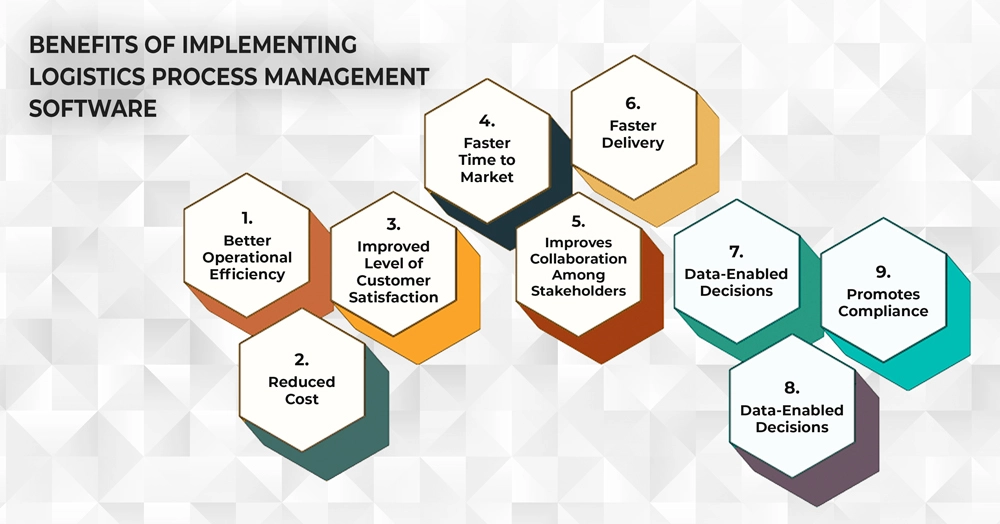
Let’s now dive into various benefits that make Logistics Management Software Development or Transportation Software Development worth investing in for modern businesses.
- Better Operational Efficiency
The logistics management software system helps in the transformation of transportation processes by removing manual tasks, lessening errors, and improving the use of resources. Apart from aiding faster responses to changes arising unexpectedly, the software also facilitates elevating productivity and making businesses more competitive and resilient.
- Reduced Costs
The LMS also helps bring down costs for involved businesses in various ways. It recognizes cost-effective order delivery methods by evaluating various shipping options, carriers, and routes for transportation. Moreover, the software aids in bringing down expenses by eliminating unnecessary steps that add to operating costs and by automating processes. Furthermore, the logistics software helps businesses optimize delivery routes that leads to cost-friendly transportation. Additionally, the software enables businesses to attain improved inventory control. This results in reduced inventory holding, better optimization of resources, lowering of operational costs, and improved profitability.
- Improved Level of Customer Satisfaction
The logistics software enables faster processing of customer orders and reliable and on-time delivery of products ordered by them. Moreover, it facilitates proactive communication with the customers that leads to happier, elevated, and satisfactory customer experiences. Furthermore, features like virtual assistants, chatbots, and automated updates let a business improve the quality of its services. This improves customer satisfaction of customers and makes their trust and loyalty towards the business stronger. This will make them choose the same business again and again.
- Faster Time to Market
The logistics management software system helps to make supply chains structured and organized. Structured supply chains enable faster production, which is vital at the time of launching new products. Diminished lead times enable businesses to adapt swiftly to emerging trends in the market and tap fleeting opportunities.
- Improves Collaboration Among Stakeholders
The logistics process management software system brings together and connects various stakeholders within the supply chains. To bring them on the same page, the software delivers them updates in real-time and promotes lucid communication among them.
The software thus helps to minimize delays and errors and fosters the formation of robust relationships within the entire supply chain. Moreover, the system ensures that various stakeholders within the supply chain remain informed during different stages.
- Faster Delivery
The logistics management software makes delivery times swifter by streamlining various steps in the process. This includes choosing the appropriate carriers and recognizing the most efficient routes. This results in rapid shipments of ordered goods, decreased delays in deliveries, and contented and loyal customers.
- Data-Enabled Decisions
To extract useful and actionable insights from data for letting businesses make better and informed decisions, the logistics software analyzes huge amounts of data obtained from different sources. Businesses can apply the obtained data and insights to enhance their production and distribution and make strategic decisions regarding demand forecasting. They can also use this data for implementing supply chain automation that results in the streamlining of processes and improvement in efficiency in production, distribution, and demand forecasting.
- Promotes Compliance
The logistics management software system helps businesses achieve compliance in various ways. These include enabling real-time tracking and visibility, and automating documentation. Moreover, they include tracking regulatory changes, maintaining the accuracy of data, and streamlining audits. The software facilitates the development of tailored workflows for compliance-centered processes. Moreover, it offers useful features like audit trails for maintaining transparency throughout the supply chains. Furthermore, the software makes use of artificial intelligence technology to keep pace with the evolving rules. The logistics software thus enables businesses to maintain strict adherence to laws associated with trading, transportation of goods, customs, and safety.
- Fosters Environmental Sustainability
The logistics process management software promotes the achievement of environmental sustainability through the optimization of route planning of routes, resulting in less fuel consumption and emissions. Moreover, the software helps to improve the management of inventories for reduction in waste. Additionally, it facilitates the consolidation of shipments for better efficiency. Furthermore, the software provides insights to companies that have been extracted from data. The insights let them effectively monitor and enhance their carbon footprint.
To achieve these striking advantages for your business, you need to create a custom logistics management software system that can be operated from multiple devices, including tablets and computers as well as mobile phones. Alternatively, you can develop a dedicated, tailored logistics management app that operates only from mobile devices. Building these advanced technology-based solutions requires specialized technological knowledge and expertise. Therefore, you need to partner with a reputable and specialist Logistics App Development Services Providing Company that also offers Logistics Management Software System Development for desktops and other devices.
Types of Logistics Management Software
Logistics software can range from those catering to particular operations and aspects within a supply chain such as warehouse management systems and transportation management systems, to broader integrated platforms like comprehensive supply chain management suites and enterprise resource planning systems. These different types of logistics software offer features for managing different aspects of logistics businesses. These include inventory, warehouse operations, and freight. The other aspects include delivery and overall supply chain visibility.
These are some usual types of logistics management software.
Warehouse Management Systems
Also called WMS, these systems emphasize optimizing various warehouse-related operations. These include monitoring of inventories, management of space, and fulfillment of customer orders.
Transportation Management Systems (TMS)
Transportation Software Development Solutions cater to the management of the transportation of goods. Moreover, the solutions cover various related aspects like the selection of carriers, optimization of routes for the movement of goods, and auditing of freight.
Enterprise Resource Planning (ERP) Systems
These systems perform the integration of multiple logistics functions into a single and overarching system. These functions include warehouse, inventory, and transportation management.
Fleet Management Software System
It emphasizes the management of a company’s fleet of vehicles, including the management of drivers, real-time location tracking, and vehicle maintenance.
Order Management Systems (OMS)
Order management systems manage customer orders right from receipt to fulfillment and delivery, and they are often integrated with WMS and TMS.
Demand Forecasting Software System
It utilizes data-enabled analytics to predict customers’ future demand for products. Thus, the software helps businesses in more effective planning of their inventories and resources.
Route Optimization Software System
This particular software is specifically designed to find the most efficient routes for the delivery of customer orders. It thus helps to bring down travel time and costs for the businesses involved.
Real-Time Tracking Software
Real-time tracking software shares with businesses live updates related to the location of shipments and their statuses. This helps improve visibility and enables a quick response to issues.
Freight Forwarding Software System
This specific software streamlines the processes associated with international freight. This includes managing carriers, handling documentation and customs, and processes in between.
Supply Chain Management Software System
SCM Software system is a comprehensive logistics management software with which businesses can achieve enhanced control and gain end-to-end visibility over the whole supply chain. This includes sourcing raw materials for production from specific suppliers and transporting finished products to customers or retailers for delivery as per their orders.
Things to consider while choosing the best fit logistics management software system for your supply chain needs
A wide variety of tools is available in the market. Therefore, it may be difficult for you to choose the ideal and right fit logistics process management software system for your business needs. Considering and following these steps will aid you in making the right decision..
- Do assessment of your business needs and goals
Divide your logistics process into various steps and find out the areas where bottlenecks occur. Your pain points may be inefficient utilization of fleets or delayed last-mile deliveries. Clear visibility into your pain points will guide you in your software choice.
If your concern is complex delivery timelines, then logistics scheduling software might be necessary for you. If you want to attain end-to-end control, then logistics tracking software could be the right fit for your needs. Your choice of logistics management software must directly tackle your operational priorities.
- Compare features and pricing
See beyond the basics to find software that matches your logistics priorities. Solutions like logistics delivery and management software elevate visibility and communication, while logistics planning software is useful for supporting optimization of routes and fleet management. Try to strike a balance between the software’s features and long-term value and potential cost savings provided by it.
Put your focus on software with particular logistics features like integrated inventory monitoring, automated load planning, or dynamic route adjustments. These functionalities often provide the greatest return on investment.
- Consider scalability and customization
Logistics operations grow with the expansion of businesses. Therefore, opt for a system that is capable of scaling with additional warehouses, elevated shipment volumes, and larger fleets. Moreover, you have to make sure the system is compatible with other logistics tools presently used by your business. These tools may include transportation management systems (TMS) and warehouse management systems (WMS), among others.
You should raise questions before software providing vendors about how their software adapts to the growth and expansion in logistics-intensive industries. Scenarios such as the adoption of multi-warehouse inventory systems or adding international shipping can help to test a solution’s scalability.
- Assess support services and the reputation of the software provider
Though the software offered by a software provider is important, the reliability and expertise of the provider are equally important. Keeping this in view, opt for those vendors that have a strong track record in innovation and those that have extensive industry knowledge. Moreover, make sure they provide powerful infrastructure and help resolve any technical issues quickly to reduce disruptions.
Therefore, test the support provided by the software provider before committing to their solution. You can ask him particular technical questions to test his support. Alternatively, you can make a request to the provider to arrange a demo session to assess their expertise and level of responsiveness.
- Analyze costs and return on investment
You need to analyze the total cost of ownership. This includes expenses associated with setting up, integrating, and maintaining the logistics management software system. Moreover, take into account the return on investment (ROI) that the software can provide to your business. The ROI can be in terms of better inventory management and diminished transportation costs. Furthermore, the ROI can be in terms of more efficient workflows or enhanced delivery times.
You can use your logistics-related data to create a baseline and calculate the potential ROI your business can achieve. As an example, if overstocking of goods is causing you losses, then assess how the software can help to directly bring down these losses.
These steps can aid you in easily identifying the best logistics software that is the right fit for your supply chain business and make sure it grants you the required value and performance to improve your operations.
The Current Trends in Logistics Management Software Systems
Keeping yourself aware of the innovations in logistics technology helps you discover new business opportunities. The awareness also helps you surpass customer expectations and stay ahead of the competition.
These are the leading trends in logistics management software systems. They have already impacted the way businesses function in the logistics and supply chain sector.
Hyperautomation
Hyperautomation has redefined efficiency in logistics businesses. It has gone beyond automation of individual tasks and has integrated advanced technologies like artificial intelligence, machine learning, robotic process automation, and business process management to build intelligent and interconnected systems. AI dynamically makes adjustments to delivery routes according to real-time data obtained regarding traffic or weather conditions, whereas predictive analytics notices potential disruptions before they intensify.
AI and Machine Learning
Artificial Intelligence and Machine Learning technologies have become the main drivers of innovation today. These advanced technologies now form the nucleus of supply chain management logistics software systems. Artificial Intelligence helps improve processes like demand forecasting by recognizing precise inventory needs across specific locations and timelines. Machine learning helps to unravel patterns and areas of inefficiency that let businesses adapt and change to shifting demands. Machine learning-enabled advanced predictive maintenance helps ensure that equipment and vehicles remain operational. This resultantly decreased downtime and prevents unexpected costs for businesses.
IoT
Internet of Things (IoT) technology helps in the expansion of visibility in supply chain management through real-time tracking. Sensors perform the monitoring of shipments during their movement. Moreover, they deliver data associated with the location, condition, and various environmental factors such as temperature, humidity, rain, and wind. Warehouses driven by IoT automate inventory-related checks and streamline operations, whereas connected fleets make use of telematics and Global Positioning System( GPS) to optimize routes and the performance of vehicle drivers. This enhanced level of visibility allows businesses to make better decisions in a swift manner.
Blockchain
Blockchain technology helps in the development of trust among various involved businesses by enabling a high degree of transparency in the supply chains. Its immutable and secure records ensure accurate tracking of goods right from origin to delivery. Smart contracts help automate processes like payments that consequently bring down delays and disputes. Blockchain in logistics management software enables companies to provide a clear and verifiable record of each and every transaction to their stakeholders.
Sustainability and Eco-friendly Logistics Solutions
Sustainability and eco-friendly logistics tools are the forefront of focus for supply chain businesses today. Earlier, sustainability was a secondary concern for businesses, but now it has become an important business priority for them. Logistics software enables businesses to bring down carbon output, reduce waste, and adopt greener practices in terms of efficient delivery routes and electric fleets. These advancements in Transportation Software Development Solutions and Logistics Management Software Systems help businesses respond to stringent regulations and growing consumer awareness and expectations for eco-conscious operations.
Cloud Technologies
Cloud technologies impart flexibility to businesses. Resultantly, cloud-based logistics process management software has become the mainstay of modern supply chains. This software enables businesses to scale quickly according to the growth in their operations and remain adaptable to the changing demands of markets and customers. Furthermore, the logistics management software system keeps data in a centralized location, which helps to improve collaboration. While edge computing further elevates efficiency by processing data closer to the source, serverless architecture does away with the need for complex infrastructure management.
Interconnected Systems
Interconnected systems are driving collaboration for logistics businesses today. The modern logistics management software system depends on seamless integration between various systems. Application programming interfaces (APIs) facilitate the transfer of data between the logistics software system and other tools being used by businesses. Their use leads to the creation of an interconnected ecosystem for collaboration and sharing of real-time updates. Businesses following this approach are able to boost their supply chain efficiency as well as make smarter decisions in the interest of their business.
User-Centric Software
User-focused software has taken the lead among businesses operating in the logistics arena. Today, the logistics software puts users first. Therefore, the software provides them with intelligent and clean designs that are also easily navigable. The mobile-centered approach of the software provides seamless access to teams irrespective of their location. Personalization helps to augment the software by making it adaptable to particular roles. These include letting a fleet operator manage routes in a more effective manner or aiding a warehouse manager to stay in the know of inventory.
Warehouse-Based Robotics
Warehouse robotics has now become a norm for optimization of logistics and supply chain operations. Warehouse-based robotics systems have undergone a change from being a novelty to becoming essential for optimizing operations. They are being increasingly tested and adopted by businesses. Businesses leading in the supply chain space now have access to diverse advanced solutions customized to their needs. These include high-density storage and retrieval systems and goods-to-person robots. Moreover, they include collaborative robots, also known as cobots, that are exclusively designed to operate safely side by side with human workers.
These technological advancements are not progressive in nature; rather, they are transformative. Businesses adapting to these latest trends in logistics management software systems will not just keep pace with an increasingly demanding marketplace, but they will also set the benchmark in the marketplace.
Now you have comprehensive knowledge about various facets of a logistics management system, including how it can help you address various challenges faced by your supply chain business. These challenges include running your operations efficiently, improving your workflows, and optimizing space and operations in your warehouses. Moreover, the challenges include choosing the right carriers, optimizing resource allocation, selecting the most efficient routes for delivery, and tracking drivers’ safety and equipment and vehicle maintenance needs. Some other challenges include keeping your costs low and elevating customer satisfaction.
Considering the logistics management system’s ability to effectively tackle these challenges and deliver intended results and gains to your business, it can help you decide in favor of adopting an advanced logistics management system customized to your needs. Taking this decision is in the best interest of sustenance, stability, profitability, growth, success, and competitiveness of your business. Therefore, take this decision carefully.
Once you have decided to opt for a logistics management software system or app for your business, you need to partner with a specialist provider of Logistics App Development Services and Logistics Software Development Services for its creation. Capanicus is such a renowned logistics app and software development company with extensive technological expertise and hands-on experience in building innovative, advanced, and business-transforming software solutions for the logistics industry.
Whether you need a comprehensive supply chain logistics management solution for end-to-end supply chain management or just a dedicated Transportation Software Development Solution for solely handling your entire goods movement process, your needs are fully covered with us. To let us deliver a smooth and successful custom logistics software or app development and implementation experience to your business, you only need to take the first step of discussing your unique business requirements with our software development experts. They will take care of the rest!









